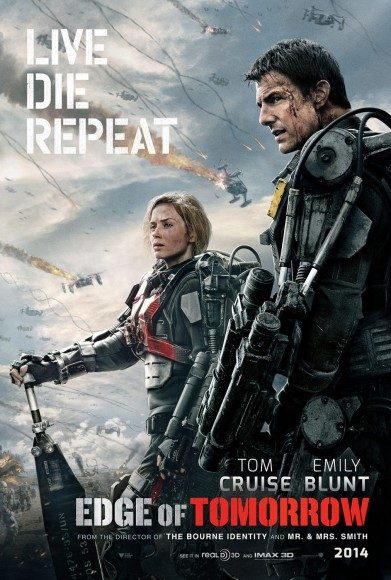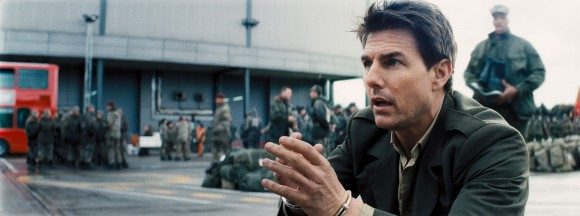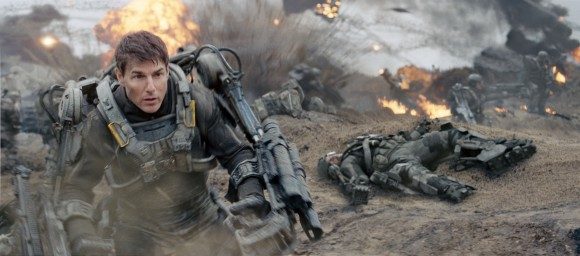Here’s the skinny on Edge of Tomorrow: it’s a perfectly competent, perfectly capable summer action movie. It might even be my second-favorite such film of the year (behind Captain America: The Winter Soldier). It’ll keep you entertained, especially if you’re an action and/or sci-fi fan, Tom Cruise and Emily Blunt are enjoyable, and there is almost nothing that’s overtly “wrong” with the film. In short, it’s a safe option for your Friday night.
Ah, is your spidey-sense tingling? Yes, there’s a “but” coming.
BUT there’s very little of significance in the movie, which is a shame with any film, but all the more so because this movie seems to go out of its way to create historical parallels. So much of this review will focus on those shortcomings in creative vision, because when you ask if the movie succeeded in achieving what it set out to do, it’s hard not to answer with a simple “Sure.”
The premise of the movie, if you’ve missed the trailers emblazoned with the slogan “Live. Die. Repeat.” is that Tom Cruise plays a soldier who stumbles into a time loop wherein every time he dies he finds himself waking back up at a particular point the day before the military action that leads to his death. What the trailers (smartly) fail to divulge is that Cruise isn’t much of a soldier – he’s actually an Army PR guy who gets unwillingly thrust onto the front lines. The first five minutes of the film function a lot like the opening sequence from one of last year’s sci-fi blockbusters – Pacific Rim. It quickly gives us the back story for the world we’re being dropped into: aliens have unexpectedly attacked (don’t they always) and there is now a front between a desperate collective human military and the territory claimed by the aliens, dubbed “Mimics.”
There are actually a couple nifty parts to this intro. The first is that the aliens crash-landed in Europe and have basically replicated the Nazi occupation of Europe during WWII, and the second is that we’re treated to a glimpse at what the modern media might be up to if a full-scale war was actually being waged. The media focus only ends up being a tiny part of the film, never to be returned to, but it’s rather amusing while it lasts.
The front line assault which Cruise aka Major Cage (don’t you love character names that spell everything out for you?) is literally dropped onto is a massive synchronized offensive against the borders of Mimic-occupied Europe. Cruise and his unit are ferried from base in London to fight on the beaches of France.
And so our stage is set: Cruise find himself on endless loop during the Allied invasion of France during World War II, take two
That seems like it would (should?) be the premise for something with a ton of relevance. There are so many places to go. Could there be commentary on the cyclical nature of man’s violence? Or even man’s resilience in the face of adversity? Or could the media angle come back and underscore the banality of war and/or the banality of most modern media? Considering that the atomic race was a major underlying narrative to WWII and this movie begins by applauding the latest warfighting technology (the mechanized suits you see on the poster), you might even go that angle. That might have been particularly interesting given that the suits are something in the hands of each and every soldier individually.
But nowhere do we find any of this. The closest thing we get is the arc of Cruise’s character from coward to noble warrior. That shouldn’t be overlooked, as it’s a huge part of what keeps him interesting, but it’s no substitute for lack of thematic significance, either. In that realm, the film comes up empty.
I’d like to clarify that I don’t think theme is everything – in fact, I actively rebelled against this notion during my formal education. If Edge of Tomorrow is nothing else, it’s a narrative sustained on its own energy, and there’s value in that. But look at Lord of the Rings, for example, or Star Wars. Certainly, the driving force is a question of, “What happens next?” But underlying both of those films is a sense of importance beyond just defeating Sauron or the Empire. We’re more than merely content to watch Frodo or Aragorn or Luke or Leia fight their respective antagonists because it looks kind of cool. We care about them individually, and we instinctively attribute meaning to their struggles.
Cruise’s Major Cage or Emily Blunt’s war hero Rita, by contrast, are fine as stand ins for the audience, but their personalities only extend as far as doing the same things most of us would do in their shoes, and the ultimate good they’re striving for is preservation of the human race against a bunch of barely incarnated Maguffins.
The Verdict: 3 out of 5
In many ways, it’s a testament to Edge of Tomorrow that it can garner a positive review when it’s so devoid of anything that could be called transcendent substance. Cruise is likeable as ever, especially as a hard-luck coward who blunders his way through much of the movie, and hard-edged Rita (Blunt) is a nice foil. The time-travel/time-reset mechanic is handled very well, and the narrative presents clearly defined and understandable goals for its characters to try to achieve. None of that makes Edge of Tomorrow a movie I’m likely to return to time and again, but it does make it a movie I found reasonably enjoyable during the time I had with it.





